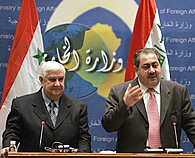2006年VOA标准英语-Talking to Iran and Syria - Will It Work and At(在线收听)
By Sonja Pace
London
22 November 2006
 |
| Syria's Foreign Minister Walid Moallem, left, listens as Iraq's Foreign Affairs Minister Hoshyar Zebari talks during a media conference in Baghdad Tuesday, November 21, 2006 |
U.N. Secretary General Kofi Annan told reporters in Geneva this week that Iran and Syria could play a positive role to help stabilize the extremely violent situation in Iraq and has urged them to do so. The United States remains skeptical that either Damascus or Tehran really wants to help and instead the Bush Administration has repeatedly accused both of unhelpful interference and of supporting terrorism and violence.
Tuesday's assassination in Beirut of prominent Lebanese Christian leader and cabinet minister, Pierre Gemayel is likely to strengthen Washington's argument. Some Lebanese officials quickly accused Syria of having a hand in the assassination, just as Damascus has been implicated in the killing last year of Lebanese Prime Minister Rafik Hariri.
Still, there is increasing pressure for Washington to talk with Syria and with Iran - especially about the deteriorating situation in Iraq.
Speaking on British radio, former British ambassador to Washington, Christopher Meyer said such a dialogue makes sense.
"There is only one question you ask in this - do they [Syria and Iran] influence what is going on in Iraq or do they not influence what is going on in Iraq," he said. "If the answer is yes, somehow you engage with them. Sticks and carrots - it may work, it may not. But, just to turn your back on them is rank silliness."
The Bush administration says dialogue is possible, but only if Iran and Syria change their ways. The U.S. wants Tehran to halt its nuclear program, stop allowing fighters and weapons to cross over into Iraq and stop supporting what Washington considers terrorist groups, such as Hezbollah in Lebanon. The administration wants Syria to also halt support of terror groups and stop what Washington says is Damascus' continued interference in Lebanon.
Syrian officials have repeatedly said they seek a dialogue with the United States and Syrian cabinet minister Buthayna Shaaban recently repeated the offer, but also sought to put the onus on Washington.
"Syria continues to believe in talking, but of course never accepted conditions either to talk or to do anything and the American administration knows this," said Shaaban.
Syria has repeatedly denied stirring up trouble in Lebanon, having a hand in assassinations there or supporting terrorist groups.
Iranian President Mahmoud Ahmadinejad has also said he's ready to talk to the United States.
At a recent news conference in Tehran, President Ahmadinejad said the current state of relations between Iran and the United States is the fault of the U.S. - because of America's behavior, as he put it, adding if they correct their behavior, we will negotiate with them.
Iranian political analyst, Meir Javedanfar tells VOA dialogue would certainly be good - for Iran, but he warns it comes as a price.
"One of the biggest reasons why Iran got involved in Iraq in the first place was so that it has a bargaining chip. What they want for calm in Iraq is that the British and Americans allow Iran to continue with its enrichment program, to stop threatening Iran at the U.N.," said Javedanfar. "And, I'm not sure that Tony Blair or President Bush are prepared to pay that price, but as far as the Iranians are concerned, they want a deal, they've been looking for a deal for a long time."
Javendanfar is director of Meepas, a Tel Aviv-based Web site analyzing Middle East economic and political affairs.
Javedanfar says the United States and Britain must increase their bargaining pressure by threatening targeted sanctions against Iran's leadership, but also by offering economic incentives for Iran to lower its own demands for coming to the bargaining table.
Talking to Iran and Syria is expected to be among the proposals outlined in the U.S. Iraq Study Group report, which is due to be made public next month.